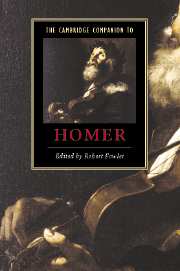Book contents
- Frontmatter
- 1 Introduction
- Part 1 The poems and their narrator
- Part 2 The characters
- Part 3 The poet’s craft
- Part 4 Text and context
- Part 5 Homeric receptions
- 15 Homer and Greek literature
- 16 Roman Homer
- 17 Homer and English epic
- 18 Homer and the Romantics
- 19 Homer and Ulysses
- 20 Homer
- 21 ‘Shards and suckers’
- 22 Homer in English translation
- Dateline
- List of works cited
- Index of passages discussed
- General Index
17 - Homer and English epic
from Part 5 - Homeric receptions
Published online by Cambridge University Press: 28 May 2006
- Frontmatter
- 1 Introduction
- Part 1 The poems and their narrator
- Part 2 The characters
- Part 3 The poet’s craft
- Part 4 Text and context
- Part 5 Homeric receptions
- 15 Homer and Greek literature
- 16 Roman Homer
- 17 Homer and English epic
- 18 Homer and the Romantics
- 19 Homer and Ulysses
- 20 Homer
- 21 ‘Shards and suckers’
- 22 Homer in English translation
- Dateline
- List of works cited
- Index of passages discussed
- General Index
Summary
The subject of this chapter - in keeping with its chronological place in this section - is the importance of Homer for English epic up to the end of the eighteenth century. Its rationale, however, is not solely diachronic: the starting point is rather a widely accepted premise that between what goes before and what comes after there is a fault-line in the nature of the availability of Homer to English literary consciousness. A critical event can be readily identified, in the publication of F. A.Wolf’s Prolegomena to Homer of 1795. This work itself is the product of a period of change and questioning: the eighteenth century saw a steady growth in historical, topographical and antiquarian interest in the ancient world. In relation to Homer, Robert Wood had provided one of the most influential landmarks in his investigation, based on travels undertaken in the early 1750s, of Homer’s own time and culture, An Essay on the Original Genius of Homer (1769). Wolf, however, is definitive:
The Homer that we hold in our hands now is not the one who flourished in the mouths of the Greeks of his own day, but one variously altered, interpolated, corrected, and emended from the times of Solon down to those of the Alexandrians. Learned and clever men have long felt their way to this conclusion by using various scattered bits of evidence; but now the voices of all periods joined together bear witness, and history speaks.
- Type
- Chapter
- Information
- The Cambridge Companion to Homer , pp. 272 - 286Publisher: Cambridge University PressPrint publication year: 2004
- 2
- Cited by



